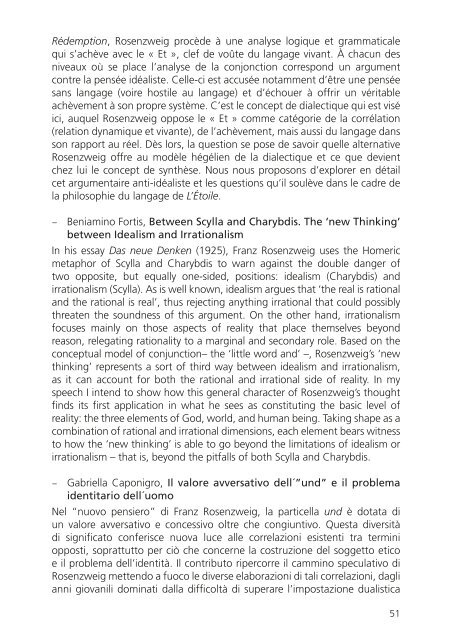Franz Rosenzweig
VZ2hG1
VZ2hG1
You also want an ePaper? Increase the reach of your titles
YUMPU automatically turns print PDFs into web optimized ePapers that Google loves.
Rédemption, <strong>Rosenzweig</strong> procède à une analyse logique et grammaticale<br />
qui s’achève avec le « Et », clef de voûte du langage vivant. À chacun des<br />
niveaux où se place l’analyse de la conjonction correspond un argument<br />
contre la pensée idéaliste. Celle-ci est accusée notamment d’être une pensée<br />
sans langage (voire hostile au langage) et d’échouer à offrir un véritable<br />
achèvement à son propre système. C’est le concept de dialectique qui est visé<br />
ici, auquel <strong>Rosenzweig</strong> oppose le « Et » comme catégorie de la corrélation<br />
(relation dynamique et vivante), de l’achèvement, mais aussi du langage dans<br />
son rapport au réel. Dès lors, la question se pose de savoir quelle alternative<br />
<strong>Rosenzweig</strong> offre au modèle hégélien de la dialectique et ce que devient<br />
chez lui le concept de synthèse. Nous nous proposons d’explorer en détail<br />
cet argumentaire anti-idéaliste et les questions qu’il soulève dans le cadre de<br />
la philosophie du langage de L’Étoile.<br />
– Beniamino Fortis, Between Scylla and Charybdis. The ‘new Thinking’<br />
between Idealism and Irrationalism<br />
In his essay Das neue Denken (1925), <strong>Franz</strong> <strong>Rosenzweig</strong> uses the Homeric<br />
metaphor of Scylla and Charybdis to warn against the double danger of<br />
two opposite, but equally one-sided, positions: idealism (Charybdis) and<br />
irrationalism (Scylla). As is well known, idealism argues that ‘the real is rational<br />
and the rational is real’, thus rejecting anything irrational that could possibly<br />
threaten the soundness of this argument. On the other hand, irrationalism<br />
focuses mainly on those aspects of reality that place themselves beyond<br />
reason, relegating rationality to a marginal and secondary role. Based on the<br />
conceptual model of conjunction– the ‘little word and’ –, <strong>Rosenzweig</strong>’s ‘new<br />
thinking’ represents a sort of third way between idealism and irrationalism,<br />
as it can account for both the rational and irrational side of reality. In my<br />
speech I intend to show how this general character of <strong>Rosenzweig</strong>’s thought<br />
finds its first application in what he sees as constituting the basic level of<br />
reality: the three elements of God, world, and human being. Taking shape as a<br />
combination of rational and irrational dimensions, each element bears witness<br />
to how the ‘new thinking’ is able to go beyond the limitations of idealism or<br />
irrationalism – that is, beyond the pitfalls of both Scylla and Charybdis.<br />
– Gabriella Caponigro, Il valore avversativo dell´”und” e il problema<br />
identitario dell´uomo<br />
Nel “nuovo pensiero” di <strong>Franz</strong> <strong>Rosenzweig</strong>, la particella und è dotata di<br />
un valore avversativo e concessivo oltre che congiuntivo. Questa diversità<br />
di significato conferisce nuova luce alle correlazioni esistenti tra termini<br />
opposti, soprattutto per ciò che concerne la costruzione del soggetto etico<br />
e il problema dell’identità. Il contributo ripercorre il cammino speculativo di<br />
<strong>Rosenzweig</strong> mettendo a fuoco le diverse elaborazioni di tali correlazioni, dagli<br />
anni giovanili dominati dalla difficoltà di superare l’impostazione dualistica<br />
51


